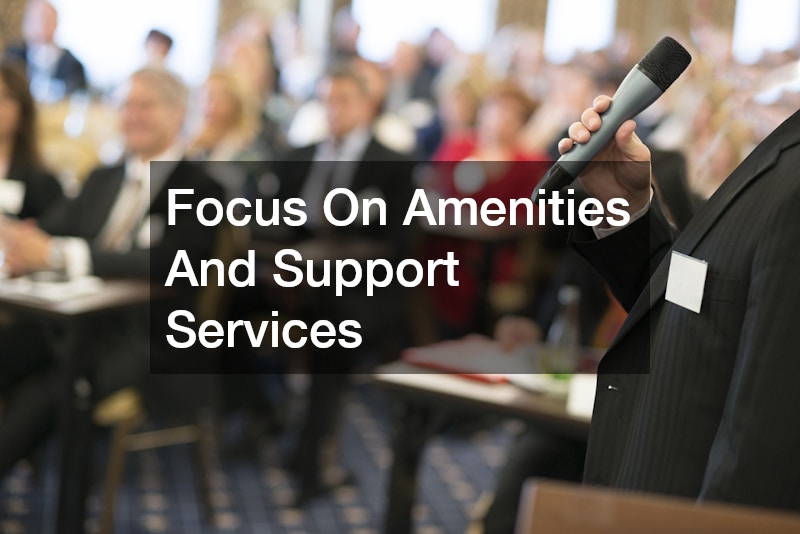When planning a business meeting or corporate event, securing the right venue is crucial. The space you choose can influence productivity, communication, and overall attendee satisfaction. Renting a conference space that fits your team’s needs requires careful thought, preparation, and consideration of several key factors. From layout and accessibility to technology and amenities, each element plays a role in creating a productive and comfortable environment. In this article, we explore essential tips to ensure your conference space rental is effective and aligns with your business goals.
Understand Your Event Needs
Before booking any venue, it is important to evaluate the specific requirements of your event. Consider the number of attendees, the type of activities you will conduct, and the atmosphere you want to create.
A formal presentation might require a theater-style arrangement, while a collaborative workshop may need a space with movable tables and seating to encourage discussion. Assessing the purpose and objectives of your meeting will help narrow down options and ensure that the space supports the intended outcomes.
In addition to layout, think about scheduling and duration. Some spaces are designed for short meetings, while others are equipped to accommodate multi-day conferences. Understanding these nuances ahead of time allows you to select a location that meets both logistical and strategic requirements. Booking the wrong space can lead to disruptions, discomfort, or inefficiencies, which can negatively impact the overall success of your event.
Consider Location And Accessibility
The location of your conference space is another crucial consideration. Ideally, the venue should be easy for attendees to access, whether they are commuting locally or traveling from out of town. Proximity to public transportation, parking availability, and nearby accommodations can make a significant difference in attendee convenience and satisfaction. A conveniently located space reduces stress and helps ensure punctuality, which is essential for maintaining a professional atmosphere.
Accessibility goes beyond transportation. Consider the physical accessibility of the venue, including ramps, elevators, and seating arrangements that accommodate all participants. Ensuring the space is inclusive and easy to navigate reflects a commitment to attendee comfort and professionalism. When evaluating potential venues, visiting the site in person can provide a better understanding of accessibility features and help identify any potential challenges.
Evaluate Technology And Equipment
Modern business meetings often rely on technology for presentations, video conferencing, and collaborative work. Before renting a conference space, verify the availability and quality of equipment such as projectors, sound systems, Wi-Fi, and video conferencing tools. Reliable technology ensures that presentations run smoothly and that participants can engage fully, whether attending in person or remotely.
It is also important to understand the support services offered by the venue. Some spaces provide technical assistance, setup, and troubleshooting, while others leave these responsibilities to the renter. Knowing the level of support available helps avoid unexpected complications and ensures a professional and seamless experience. Testing equipment prior to the event can further reduce the risk of technical difficulties, allowing attendees to focus on the content rather than the logistics.
Assess Ambiance And Comfort
The ambiance of a conference space can significantly impact focus, engagement, and overall satisfaction. Consider factors such as lighting, acoustics, ventilation, and seating comfort. Natural light can enhance mood and energy levels, while poor lighting may cause fatigue and reduce concentration. Similarly, soundproofing and good acoustics help ensure clear communication, which is vital for meetings, discussions, and presentations.
Comfortable seating and ergonomic arrangements contribute to a productive environment, particularly for long sessions. Providing a space where attendees can move freely, take breaks, and interact naturally encourages participation and collaboration. Thoughtful attention to the physical environment demonstrates professionalism and consideration, leaving a positive impression on participants.
Clarify Policies And Costs
Understanding the terms and costs associated with a conference space rental is essential for budgeting and planning. Inquire about rental fees, deposits, cancellation policies, and any additional charges for services such as catering, equipment, or staffing. Transparent communication regarding costs prevents surprises and helps you allocate resources effectively.
Additionally, clarify policies related to setup and cleanup, event timing, and any restrictions on food, beverages, or decorations. Knowing these details in advance ensures that your event runs smoothly and allows you to make informed decisions about logistics. By addressing policies and costs proactively, you reduce the risk of misunderstandings and maintain control over the event experience.
Focus On Amenities And Support Services
The availability of amenities and support services can enhance the overall experience of your conference space. Access to catering, refreshment areas, restrooms, and breakout rooms provides convenience and flexibility for attendees. Onsite staff can assist with coordination, setup, and troubleshooting, allowing you to focus on delivering content and managing participants.
Some venues also offer additional features such as parking, storage, and security. Evaluating these services in relation to your event’s needs ensures that the space not only accommodates your team but also supports a smooth, professional, and enjoyable experience. A well-equipped and well-managed space allows organizers and attendees to concentrate on the event rather than logistical concerns.
Renting a conference space that works requires a comprehensive understanding of your event’s objectives, participant needs, and logistical requirements. By carefully considering factors such as layout, location, technology, ambiance, policies, and amenities, you can select a venue that enhances productivity, engagement, and attendee satisfaction. Prior preparation, on-site visits, and clear communication with the venue ensure that your event proceeds smoothly and meets professional standards. A thoughtfully chosen conference space supports collaboration, effective communication, and overall success, leaving a lasting positive impression on participants and reinforcing your organization’s commitment to quality events.

